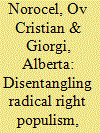| Srl | Item |
| 1 |
ID:
185903


|
|
|
|
|
| Summary/Abstract |
This Special Issue provides diverse multidisciplinary entry points that convey the multi-layered complexity of the interactions between radical right populism, gender issues, and religious questions. It fills a gap in the scholarship dealing with the political and social manifestations of radical right populism. From a theoretical point of view, the connections between radical right populism and gender and between radical right populism and religion, respectively, have received growing scholarly attention. The present Special Issue bridges these separate lines of inquiry, concentrating on how issues of gender and religion are jointly addressed in radical right populist discourses. The articles in this Special Issue provide the first in-depth and comparative understanding of the entanglements of gender and religion in radical right populist ideology, explore the active role of religion in the populist discourse, and invite to combine the analysis of the political sphere with the analysis of occurrences in the broader society.
|
|
|
|
|
|
|
|
|
|
|
|
|
|
|
|
| 2 |
ID:
185904


|
|
|
|
|
| Summary/Abstract |
We examine here how issues of gender and religion are employed for ideological purposes in the discourses of radical right populist parties in Sweden and Finland. We begin with the complexity of these societies as paragons of social welfare and gender equality, within which Lutheran Christianity discreetly underpins their largely secularised character. Employing a poststructuralist methodological approach, we analyse the key political speeches of the chairpersons of the Sweden Democrats (Sverigedemokraterna) and Finns Party (Perussuomalaiset/ Sannfinländarna). We unveil a complex interplay between gender and religion; gender equality is used strategically to strengthen and legitimise the separation between ‘the people’ and racialised Others, while references to religion are employed to rank the racialised Other as ‘less than’ the secular and modern ‘people’, and to oppose alleged inquisitorial attempts on the part of progressive left and liberal parties.
|
|
|
|
|
|
|
|
|
|
|
|
|
|
|
|
| 3 |
ID:
185905


|
|
|
|
|
| Summary/Abstract |
The Austrian Parliament has passed three laws since 2018 that prohibit wearing Muslim body-coverings in public. This departure from a formerly tolerant approach is an outcome of ongoing anti-Muslim campaigns by the radical-right populist Freedom Party of Austria (FPÖ). The party has been mobilising since the mid-1980s through the creation of two antagonisms: ‘the elite’ and second against ‘Others’ – mainly migrants. Since the turn of the century, this anti-migrant mobilisation has targeted the intersection of gender and religion by focusing on veiled Muslim women. Targeting this intersection of gender and religion, the article applies a critical frame analysis of 19 FPÖ documents from 2006 to 2020 on restrictive rulings about female Muslim body-covering. It finds that Austrian radical right populist campaigns emphasise the female body and construct the Austrian ‘people’ (biopolitics), while necropower constructs Muslim migrants as non-belonging, excludable, and erasable.
|
|
|
|
|
|
|
|
|
|
|
|
|
|
|
|